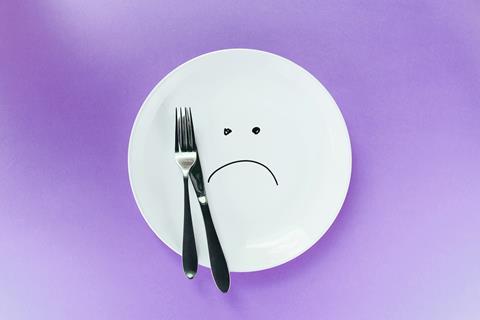Hope Virgo outlines the tough situation many families are facing and offers hope to those who are suffering

TV presenter Jeff Stellng has finished presenting Gillette Soccer Saturday for Sky Sports after 30 years. He used one of his last appearances to share his sadness at the large number of young people dying because of eating disorders and referenced Hope Virgo’s campaign ’#DumpThe Scales’ as he did so.
The cost of eating disorders on the UK is over £9.4 billion but what the financial costs fails to consider is the emotional cost alongside this. Beyond just the person with the eating disorder is their entire carer network. There is the 24/7 role of a carer watching someone you love suffering this cruel illness: an illness that sweeps through entire homes, families and keeps you awake at all hours.
When I think back over my time with an eating disorder, a carer has taken a few forms, my sister who took me to the cinema a few nights before my hospital admission, encouraging me to have a snack and creating a happy memory as we sung Top 40 on our drive to and from the cinema. My parents who sat with me encouraging me to eat, my parents who took the brunt of so many arguments, who stood there as I lobbed food at them. And my now husband, who buffers diet chat, makes sure that restaurants work for me and creates safe environments.
Juliette’s daughter was referred to CAMHS in January 2019 as she had started restricting and was losing weight. During the appointment with CAMHS, they diagnosed her as Atypical Anorexic.
“The diagnosis made her worse and more determined to lose weight. I think she felt as though she wasn’t a “proper Anorexic“. Over the next few months things got much worse for Juliette’s daughter. “It was a horrendous time for my daughter, but it also impacted hugely on the whole family. At times I did wonder where God was in all this and why He wasn’t healing her. I prayed many times a day as I was desperate to see her get better.”
“My faith has helped me immensely during this time. In early January 2019, I was praying for her recovery. I felt the Lord say to me that “ she would be okay “ Later that day when I was driving to pick her up I saw a rainbow and I knew it was God confirming His promise to me. Although she was very ill and recovery felt impossible, I never gave up hope. Quite a few of the therapists we have met over the last few years have asked me where I get my strength and hope from. It’s wonderful to be able to share that as a Christian I believe in God and I believe he will fully heal her. All glory goes to Him!”
Since 2021, Juliette’s daughter has progressed a lot and is now considering university.
A recent rise in cases
It is no secret that there has been a huge rise in eating disorders over the last few years and I am sure you have seen all the headlines stating ‘lockdown caused eating disorders’, but whilst we do know it made some issues worse, it is an oversimplification to purely blame the pandemic. We know from recent research that eating disorders are the result of genetics, an energy deficit and then contributing factors. However, despite the rise eating disorders are still massively stigmatised, still often seen as a lifestyle choice, as a phase someone goes through, as something that only impacts white teenage underweight girls. In actual fact, eating disorders present in all different bodies, and can really impact anyone no matter gender, age, race or size.
Eating disorders have the highest mortality rate out of any psychiatric illness, a fact which holds such fear and anxiety. This deadly illness and the danger behind it that holds so many carers hostage at night. And beyond this is the guilt, and often the projected guilt from services where carers can often feel blamed.
Talking about eating disorders can be hard, scary and often feel like whatever we say is wrong, but in order to help the everyone heal, behaviours need to be brought out into the light.
So, what can you do when navigating this messy situation?
- Push for the help your child needs, ask questions and don’t give up.
- Remember that your child isn’t the eating disorder.
- Make sure you understand the illness, educate yourself.
- Always believe your child can get better. Never lose hope.
- Practically what do mealtimes look like? Try and create a safe space, set mealtimes can be helpful for some, plan and offer distractions around them.
- Don’t make assumptions around why you think they have an eating disorder.
- Set boundaries so that everyone knows not to talk about diets, comment on bodies and comment on portion sizes.
- Remember the eating disorder isn’t about food, so taking the time to listen and understand is key.
- If you are having a loved one for a meal, work out what meal will work for them.
- Don’t always plan events round mealtimes.
- Help them find their reasons to recover – finding my why was key and it helped me to begin to challenge behaviours.
- Surround yourself with other carers and make time for you.
Nick Pollard writes
I couldn’t fight the mental ill-health for her. Only she could do that. I had to love her, believe in her, and help her to believe in herself again. It was Lizzie who had the lead role in her recovery. I was just a supporting actor and I had to learn what that role meant. Over time I had lots of what psychologists call ‘aha moments’, when you suddenly realise ‘aha, I see’, when the penny drops, when you see something clearly. Let me give you an example. In the early days I had an image in my mind. It felt as if the family was in a rowing boat, struggling against the current of a fast-flowing river, to get to a place called ‘Lizzie is well again’. And I felt that my role, as the Dad, was to get us there. So, I was rowing really hard, and so was my wife Carol, and other family members. And then I looked round, and there was Lizzie rowing in the opposite direction. So, I got frustrated. But then one day I suddenly realised that I had got the wrong goal. My job was not to ‘get us up the river to that place where Lizzie is well again’. Only she could do that. My role was to keep us all together in the boat. So that we could encourage her, support her, and help her as she made progress on her recovery journey. I couldn’t make Lizzie well again, but I could keep us all together in the boat.
Nick Pollard (from the Family Mental Wealth Parent Toolkit, www.Headway.Family, used with permission)
Where to get support as a carer?
- FEAST


























